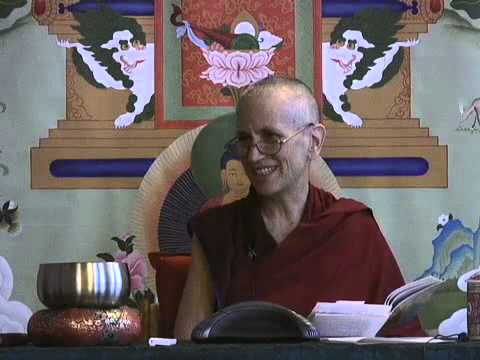Verse 40-1: Faith in the Three Jewels
Part of a series of talks on the 41 Prayers to Cultivate Bodhicitta from the Avatamsaka Sutra (the Flower Ornament Sutra).
- A definition of faith in a Buddhist context
- How faith differs from undiscriminating belief
- The importance of faith
41 Prayers to cultivate bodhicitta: Verse 40-1 (download)
We are nearly at the end of the 41 Prayers of Bodhisattvas. We’re on number 40. It says,
“May all beings attain the seven jewels of an exalted being (faith, ethics, learning, generosity, integrity, consideration for others, and discriminating wisdom).”
This is the prayer of the bodhisattva when seeing someone engaged in business.
This is interesting, when you see somebody engaged in business, you think may all beings cultivate the seven jewels of an exalted being. People, when they do business, they’re usually wanting physical jewels, but physical jewels on the spiritual level don’t do much for you. After death all of our material wealth stays here but it’s our spiritual jewels that come with us as we go on. They talk about these ten arya jewels, ten jewels of the noble ones.
The first one is faith. Faith is not a very good translation of the Buddhist word that we’re talking about. We don’t really have a very good English translation. Sometimes we say trust, sometimes we say confidence. It’s kind of a blend, or mixture, of all of them. It’s a mind that sees the good qualities in something that’s worthy of admiration such as the Three Jewels of the path to enlightenment, something like this, and has trust and confidence in that path. Then it functions in order to keep your mind very open and receptive to hearing teachings and to help your mind generate some kind of spiritual aspiration. That’s very important. We can see if we don’t have any faith, then the mind is kind of dry. Then even if we come to teachings, if we have no faith in the Three Jewels, in the path, in the teacher, then we’re kind of sitting there, “Well yeah, what do you have to say?” Then whatever they say we respond with, “Oh yeah, try and make me believe that stuff.”
Faith is a very good quality, but in Buddhism it doesn’t mean faith without investigation. It doesn’t mean that you just say to yourself, “well I believe it,” and you have no good reason for believing it. Not at all. Actually with faith in Buddhism, we should investigate the teachings and think about them. If they make sense and if they help us when we practice, then we gain faith in that way. The faith is grounded on something, it’s not “Well got to have some faith in something or this is my friends refuge. Something like that.” There’s reasons behind it. It is a very open and receptive mind that is very helpful to us on the path.
There are three different kinds of faith. I will talk more about those three different kinds tomorrow.
Venerable Thubten Chodron
Venerable Chodron emphasizes the practical application of Buddha’s teachings in our daily lives and is especially skilled at explaining them in ways easily understood and practiced by Westerners. She is well known for her warm, humorous, and lucid teachings. She was ordained as a Buddhist nun in 1977 by Kyabje Ling Rinpoche in Dharamsala, India, and in 1986 she received bhikshuni (full) ordination in Taiwan. Read her full bio.


